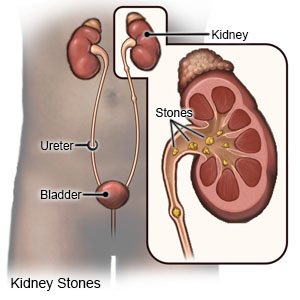Kidney Stones
Medically reviewed by Drugs.com. Last updated on Apr 6, 2025.
Kidney stones form in the urinary system when the water and waste in your urine are out of balance. When this happens, certain types of waste crystals separate from the urine. The crystals build up and form kidney stones. You may have more than one kidney stone.
 |
WHILE YOU ARE HERE:
Informed consent
is a legal document that explains the tests, treatments, or procedures that you may need. Informed consent means you understand what will be done and can make decisions about what you want. You give your permission when you sign the consent form. You can have someone sign this form for you if you are not able to sign it. You have the right to understand your medical care in words you know. Before you sign the consent form, understand the risks and benefits of what will be done. Make sure all your questions are answered.
An IV
is a small tube placed in your vein that is used to give you medicine or liquids.
Medicine:
- Alpha blockers may be given to help your kidney stones pass.
- Antinausea medicine calms your stomach and prevents vomiting.
- NSAIDs or acetaminophen may be given to help decrease swelling and pain.
- Opioid pain medicine may be given. Do not wait until the pain is severe before you ask for more medicine.
- Medicines to balance your electrolytes may be needed.
Drugs used to treat this and similar conditions
Potassium citrate
Potassium information from Drugs.com, includes potassium side effects, interactions and indications.
Tests:
- Urine tests may show if you have blood in your urine. They may also show high amounts of the substances that form kidney stones, such as uric acid.
- Blood tests show how well your kidneys are working. They may also be used to check the levels of calcium or uric acid in your blood.
- X-ray or ultrasound pictures may be taken of your kidneys, bladder, and ureters. You may be given contrast liquid before an x-ray to help these show up better in the pictures. You may need to have more than one x-ray. Tell the healthcare provider if you have ever had an allergic reaction to contrast liquid.
Treatment:
You may need any of the following if your kidney stones are too large to pass:
- Lithotripsy is a procedure that uses shock waves to break up the stones. Pieces of the stones can then pass in your urine.
- Nephrolithotomy is surgery to remove the kidney stones.
- Ureteroscopic kidney stone removal is a procedure to remove the kidney stones.
Treatment options
The following list of medications are related to or used in the treatment of this condition.
RISKS:
You may get kidney stones again, even after treatment. Kidney stones can cause an infection. Without treatment, kidney stones may cause a blockage in your kidney or ureters. This can block the flow of urine and lead to kidney damage or failure.
CARE AGREEMENT:
You have the right to help plan your care. Learn about your health condition and how it may be treated. Discuss treatment options with your healthcare providers to decide what care you want to receive. You always have the right to refuse treatment.© Copyright Merative 2025 Information is for End User's use only and may not be sold, redistributed or otherwise used for commercial purposes.
The above information is an educational aid only. It is not intended as medical advice for individual conditions or treatments. Talk to your doctor, nurse or pharmacist before following any medical regimen to see if it is safe and effective for you.
Learn more about Kidney Stones
Treatment options
Care guides
Symptoms and treatments
Medicine.com guides (external)
Further information
Always consult your healthcare provider to ensure the information displayed on this page applies to your personal circumstances.
